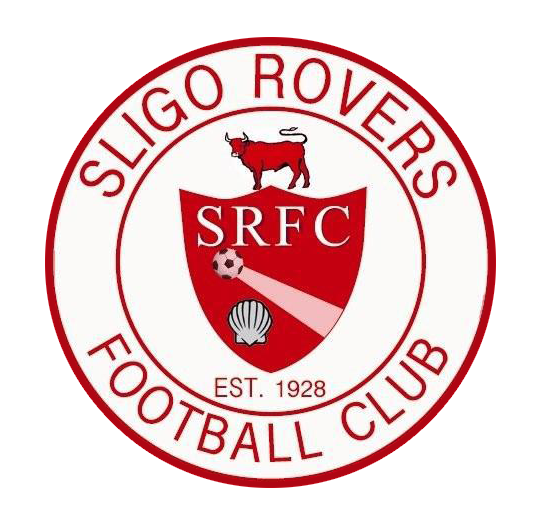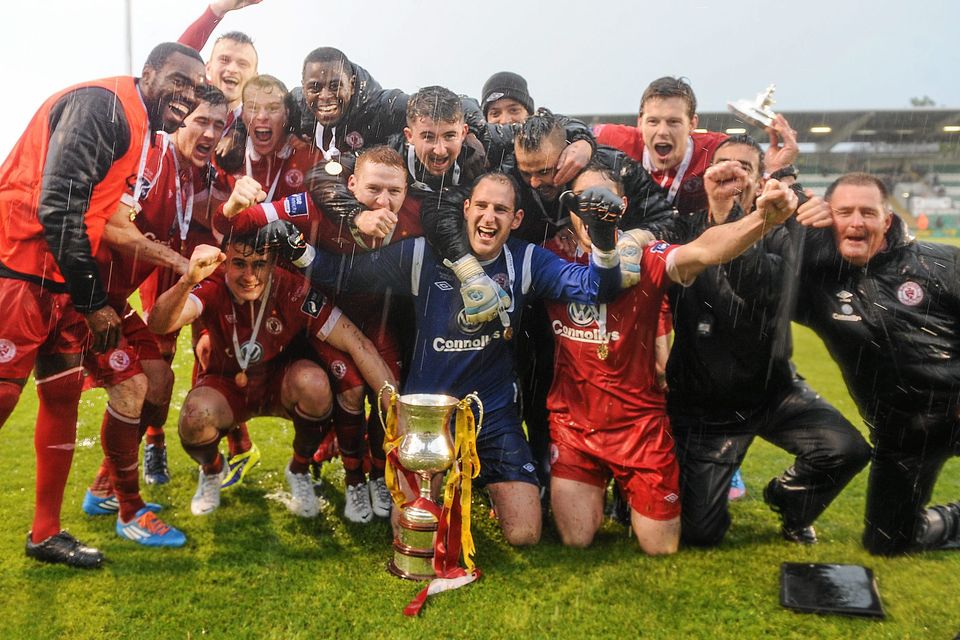By Leo Gray
This Friday, May 10th, marks the 10th anniversary of Sligo Rovers historic victory over Dundalk in the final of the Setanta Cup.
The triumph meant that Rovers claimed all the top honours in domestic soccer – the League Cup, FAI Cup (3 times), the League of Ireland Championship and the Setanta Cup – in a spectacular 4 year golden era – the quickest haul of the major trophies by any club in the country.
The record-breaking achievement was completed by the Setanta Cup success. A rain-sodden surface at Tallaght Stadium threatened to spoil the occasion as a spectacle but heroic Rovers made light of the demanding conditions and a stubborn challenge from a resolute Dundalk team to chisel out a hard-earned 1-0 victory, courtesy of a well-taken Paul O’Connor goal.
It was the ninth and final time that the cross-border tournament took place, meaning that the Bit O’Red can claim to be reigning All-Ireland soccer champions ten years on from their famous win.
Rovers demonstrated their intent right from the start of the competition, registering an emphatic 9-1 aggregate victory over Crusaders in the quarter-finals.
The first leg took place at Seaview on February 24th and it turned out to be a spectacular occasion for new recruit, Eric Odhiambo, who marked his competitive debut with an impressive hat-trick. Aaron Greene also got in on the scoring act as the Bit O’ Red cruised to a surprisingly easy 4-1 victory.
The result meant the second leg at the Showgrounds on March 10th was no more than a routine engagement for Rovers. The Irish League side, obviously demoralised from the first fixture, offered little by way of resistance and, as expected, it was all one-way traffic as Rovers romped to a comprehensive 5-0 win. Danny North helped himself to a brace while Evan McMillan, Ross Gaynor and Liam Flatley also go on the scoresheet.
St. Patrick’s Athletic were expected to provide a more searching test in the semi-final, especially as the draw dictated they would have the second leg at home.
Indeed, the first game at the Showgrounds on March 25th was a closely fought encounter. Danny North, playing against his former club, gave Rovers the lead and the Dublin side might well have settled on taking just a one goal deficit back to Inchicore for the return game. However, North struck again just before the end to give the Bit O’Red a two goal cushion.
Still, it looked as if everything was still to play for when battle resumed in Richmond Park on April 14th.
Pat’s were entitled to believe they could turn things around on their own patch but Rovers were having none of it. Producing a ruthless display of sharp attacking football and incisive finishing,
they completely overwhelmed the home side, storming to a stunning 5-1 victory, bringing the aggregate score to a comprehensive 7-1 outcome. Scorers on the night in Inchicore were Raff Cretaro (2), Joseph Ndo, John Russell, and an own goal by Foran.
Dundalk, meanwhile, came through the other side of the draw and so the scene was set for what promised to be a fascinating showdown in the decider at Tallaght Stadium on May 10th.
The formbook suggested Rovers would go into the contest as hot favourites. They had claimed an impressive haul of silverware in the preceding years while Dundalk were more accustomed to desperate relegation battles.
However, Stephen Kenny, was slowly putting a highly talented and motivated squad together at the County Louth outfit and they fancied their chances of upsetting the odds.
Few could have anticipated it then but the opposing managers in the final, Kenny and Ian Baraclough, would go on to manage the Republic of Ireland and Northern Ireland in the years that followed.
An unseasonal cloudburst which transformed the usually immaculate playing surface at Tallaght into a treacherous quagmire threatened to produce more farce than fanfare but it is to the credit of both sides that they fashioned a competitive, entertaining final.
Rovers went into battle without a number of key players, among them Gavin Peers, Alan Keane and Raff Cretaro while midfield talisman, while captain for the day, Joseph Ndo was forced to limp out of the action after 34 minutes.
On a day which demanded courage, grit and skill in equal measure, the Bit O’Red rose to the challenge magnificently, engineering a first half lead and then defending with commendable vigilance and composure after the break.
The energy-sapping conditions clearly took a heavy toll on weary limbs but, to a man, Rovers stepped up to the plate, expending every ounce of energy in pursuit of the big prize.
After clocking up a staggering sixteen goals on their way to the decider, Baraclough’s men required only one to snatch the spoils on this occasion.
And it came slightly against the run of play in the 14th minute. Greene’s pace took him clear down the right flank and his low, inviting cross was swept to the net by industrious midfielder, Paul O’Connor.
Only a few months earlier, O’Connor had been on the scoresheet for Drogheda against Rovers in the 2013 FAI Cup final but this was his turn to earn an indelible place in Sligo soccer folklore as big match hero and he grabbed the opportunity with both hands.
As Dundalk stepped up the pace in search of an equaliser, Pat Hoban twice came close to putting the sides on level terms and Richie Towell was out of luck with a powerful long range effort. And Rovers had another close shave just before the end when David McMillan’s clever lob demanded a first-class save from Gary Rogers.
Given the heroics of Rovers defensive resistance on the day, it was hardly surprising that the man-of-the-match award went to Jeff Henderson who was immense in the centre of the back four.
He said: “It’s a great honour to be chosen as the man of the match but the most important thing is that we won the Setanta Cup to add to our haul of trophies. We were under pressure at times but we kept our composure and kept them at bay. I’ve won the League, the FAI Cup and the Setanta Cup with Rovers. I could never have imagined that things would work out so well when I
joined the club. It’s incredible. Rovers are a top club and deserve to be up there challenging for all the top honours.”
By winning the Setanta Cup, Rovers carved out a unique record in Irish domestic soccer, becoming the quickest club in the country to win all the major trophies. They won the first division championship in 2005, the FAI Cup in 2010, 2011 and 2013, the League Cup in 2010, the Premier League Championship in 2012, and the Setanta Cup in 2014. No other club has ever won all those trophies in a nine year span.
No wonder manager Baraclough was elated after the club’s latest triumph.
“The Setanta Cup was the missing link in our roll of honour and we were determined to put that right”, he beamed. “It’s a significant win for the club and it’s all down to a brilliant group of players. We probably didn’t play as well as we can but that happens in Cup finals. The lads were terrific in their commitment and spirit. It was all about getting over the line.”
When skipper Ndo went off injured, North took over the captain’s armband and so had the privilege of lifting the coveted trophy after the game.
“I never thought I’d be the one to lift the Setanta Cup for Rovers but I was honoured to do so,” he enthused. “We talked about the two injured captains, Alan Keane and Gavin Peers, lifting the trophy but they didn’t seem too fussed about it so I was thrilled to get the opportunity. But, of course, it’s all about the team and the lads were brilliant. If you don’t want to win medals, you shouldn’t be playing football. With the Setanta Cup in the bag, we’ve collected the lot and it just shows what a brilliant club Sligo Rovers is”
The history-making team lined out as follows in the final: Rogers, Conneely, Henderson, McMillan, Gaynor, Russell, Ndo, Cawley, O’Connor, Greene, North. Sub: Ledwidth. Subs not used: Brush, Spillane, Maguire, Odhiambo, Dykes, Djilali. Other members of the squad were Keane, Peers, Cretaro, Brennan, Loftus, Donelon, Boylan, Murphy, Taheny, Casey, Flatley.
Dundalk lined out as follows: Cherrie, Gannon, Gartland, Boyle, Shields, Horgan, Mountney, Hoban, Massey, Towell, Meenan. Subs: Byrne, Higgins, D McMillan

